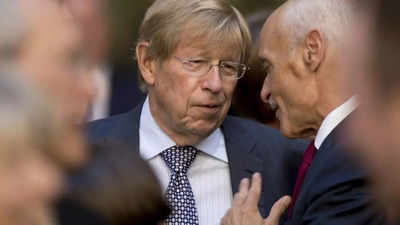
Ted Olson, a renowned lawyer who argued many important legal cases, passed away on Wednesday at the age of 84. Olson’s death was announced by his law firm, Gibson Dunn, where he had worked since 1965. The cause of death was not shared.
Olson was a key figure in significant legal battles. He successfully represented George W. Bush in the 2000 Florida election dispute that reached the Supreme Court. He served as U.S. Solicitor General under President Bush from 2001 to 2004.
One of Olson’s most impactful cases involved representing same-sex couples seeking the right to marry in California. This case went against the views of many of his fellow conservatives. During his closing argument, Olson stated: “It is the right of individuals, not an indulgence to be dispensed by the state. The right to marry, to choose to marry, has never been tied to procreation.” The case ultimately led to the legalization of same-sex marriage nationwide.
Olson argued 65 cases before the Supreme Court throughout his career, leaving a lasting impact on American law.
“Even in a town full of lawyers, Ted’s career as a litigator was particularly prolific,” said Mitch McConnell, the longtime Senate Republican leader. “More importantly, I count myself among so many in Washington who knew Ted as a good and decent man.”
Bush made Olson his solicitor general, a post the lawyer held from 2001 to 2004. Olson had previously served in the Justice Department as an assistant attorney general during President Ronald Reagan’s first term in the early 1980s.
“They weren’t just little cases,” said Theodore Boutrous, a partner at the law firm who worked with Olson for 37 years. “Many of them were big, blockbuster caes that helped shape our society.”
Those included the Citizens United v. Federal Election Commission, a 2010 case that eliminated many limits on political giving, and a successful challenge to the Trump administration’s decision to rescind the Deferred Action for Childhood Arrivals program.
“He’s the greatest lawyer I’ve ever worked with or seen in action,” said Boutrous, who worked so closely with Olson that they were known at Gibson Dunn as “the two Teds.” “He was an entertaining and forceful advocate who could go toe-to-toe with the Supreme Court justices in a way few lawyers could. They respected him so much.”
One of Olson’s most prominent cases put him at odds with many fellow conservatives. After California adopted a ban on same-sex marriage in 2008, Olson joined forces with former adversary David Boies, who had represented Democrat Al Gore in the presidential election case, to represent California couples seeking the right to marry.
During closing arguments, Olson contended that tradition or fears of harm to heterosexual unions were legally insufficient grounds to discriminate against same-sex couples.
A federal judge in California ruled in 2010 that the state’s ban violated the U.S. Constitution. The U.S. Supreme Court let that decision stand in 2013.
“This is the most important thing I’ve ever done, as an attorney or a person,” Olson later said in a documentary film about the marriage case.
He told The Associated Press in 2014 that the marriage case was important because it “involves tens of thousands of people in California, but really millions of people throughout the United States and beyond that to the world.”
His decision to join the case added a prominent conservative voice to the rapidly shifting views on same-sex marriage across the country.
Boies remembered Olson as a giant in legal circles who “left the law, our country, and each of us better than he found us. Few people are a hero to those that know them well. Ted was a hero to those who knew him best.”
Olson’s personal life also intersected tragically with the nation’s history when his third wife, well-known conservative legal analyst Barbara Olson, died on Sept. 11, 2001. She was a passenger on American Airlines Flight 77, which crashed into the Pentagon.
In recent years, his other high profile clients have included quarterback Tom Brady during the “Deflategate” scandal of 2016 and technology company Apple in a legal battle with the FBI over unlocking the phone of a shooter who killed 14 people in San Bernardino, California, in 2015.
The range of his career and his statute on the national stage were unmatched, said Barbara Becker, managing partner of Gibson Dunn.
“Ted was a titan of the legal profession and one of the most extraordinary and eloquent advocates of our time,” Becker said in a statement.






